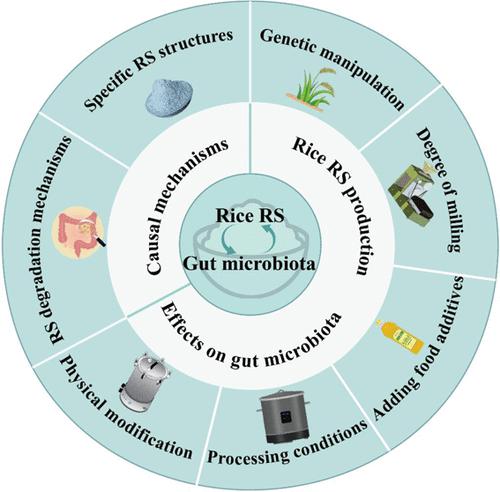当前位置:
X-MOL 学术
›
J. Agric. Food Chem.
›
论文详情
Our official English website, www.x-mol.net, welcomes your
feedback! (Note: you will need to create a separate account there.)
Influence of Resistant Starch in Whole Rice on Human Gut Microbiota─From Correlation Implications to Possible Causal Mechanisms
Journal of Agricultural and Food Chemistry ( IF 5.7 ) Pub Date : 2022-10-03 , DOI: 10.1021/acs.jafc.2c05380 Senbin Cao 1 , Cheng Li 1, 2
Journal of Agricultural and Food Chemistry ( IF 5.7 ) Pub Date : 2022-10-03 , DOI: 10.1021/acs.jafc.2c05380 Senbin Cao 1 , Cheng Li 1, 2
Affiliation

|
Rice is the main staple food for a large population around the world, while it generally has a high glycemic index and low resistant starch (RS) content. Although many strategies have been applied to develop healthier rice products with increased RS contents, their actual effects on gut microbiota and human health remain elusive. In this review, currently available production methods of rice RS are briefly summarized, followed by a critical discussion on their interactions with gut microbiota and subsequent effects on human health, from correlation implications to causal mechanisms. Different contents, types, and structures of RS have been produced by strategies such as genetic manipulation and controlling cooking conditions. The difference can largely determine effects of rice RS on gut microbiota composition and metabolites by specific RS–gut microbiota interactions. This review can thus help the rice industry develop rice products with desirable RS contents and structures to generally improve human health.
中文翻译:

全米抗性淀粉对人体肠道菌群的影响——从相关性意义到可能的因果机制
大米是世界各地大量人口的主要主食,而大米通常具有高血糖指数和低抗性淀粉(RS)含量。尽管已经应用了许多策略来开发具有更高 RS 含量的更健康的大米产品,但它们对肠道微生物群和人类健康的实际影响仍然难以捉摸。在这篇综述中,简要总结了目前可用的水稻 RS 生产方法,然后对它们与肠道微生物群的相互作用以及随后对人类健康的影响进行了批判性讨论,从相关性影响到因果机制。通过基因操作和控制烹饪条件等策略,已经产生了不同的 RS 内容、类型和结构。这种差异可以在很大程度上确定水稻 RS 通过特定的 RS-肠道微生物群相互作用对肠道微生物群组成和代谢物的影响。因此,本综述可以帮助稻米行业开发具有理想 RS 含量和结构的稻米产品,以普遍改善人类健康。
更新日期:2022-10-03
中文翻译:

全米抗性淀粉对人体肠道菌群的影响——从相关性意义到可能的因果机制
大米是世界各地大量人口的主要主食,而大米通常具有高血糖指数和低抗性淀粉(RS)含量。尽管已经应用了许多策略来开发具有更高 RS 含量的更健康的大米产品,但它们对肠道微生物群和人类健康的实际影响仍然难以捉摸。在这篇综述中,简要总结了目前可用的水稻 RS 生产方法,然后对它们与肠道微生物群的相互作用以及随后对人类健康的影响进行了批判性讨论,从相关性影响到因果机制。通过基因操作和控制烹饪条件等策略,已经产生了不同的 RS 内容、类型和结构。这种差异可以在很大程度上确定水稻 RS 通过特定的 RS-肠道微生物群相互作用对肠道微生物群组成和代谢物的影响。因此,本综述可以帮助稻米行业开发具有理想 RS 含量和结构的稻米产品,以普遍改善人类健康。




















































 京公网安备 11010802027423号
京公网安备 11010802027423号